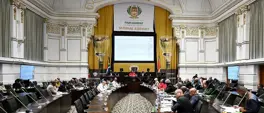MALAIKA MAHLATSI | The people must ceaselessly challenge the lawlessness of the SA government
Malaika Mahlatsi
30 May 2025 | 13:08'The people of South Africa should be ceaseless in challenging the lawlessness of our government whenever it rears its ugly head,' writes Malaika Mahlatsi.
The people must ceaselessly challenge the lawlessness of the SA government
A few weeks ago, the Supreme Court of Appeal of South Africa delivered a judgment in the Magudumana v Director of Public Prosecutions, Free State and Others.
The case sought to decide whether Magudumana’s extradition from Tanzania (which she contends was, in fact, an abduction by the South African Police Service (SAPS) on the instruction of the South African State) was lawful.
The majority judgment found that it was. But Judge Makgoka, in his minority judgment that has been lauded by international law experts, disagrees with his colleagues, arguing that the arrest of Magudumana was unlawfully disguised as an extradition when it did not, in fact, follow proper extradition processes.
The judgment is extensive, delving into the complexities of international law. But it is on page 43 of its conclusion that Judge Makgoka makes a profound reflection, one that goes beyond the case in question and to the very issue at the core of the moral crisis of the South African state – its perennial lawlessness.
Speaking to this lawlessness, Judge Makgoka quotes the words of Judge Louis Dembitz Brandeis in the Olmstead et al v United States judgment, where the then Associate Justice of the Supreme Court of the United States made this profound input: “In a government of laws, existence of the government will be imperiled if it fails to observe the law scrupulously…Government is the potent, omnipresent teacher.
For good or for ill, it breeds contempt for the law; it invites every man to become a law unto himself; it invites anarchy”.
Judge Brandeis had spent many years challenging the erosion of morality on the part of the American state, specifically about its problematic relationship with the banking industry.
For Brandeis, this relationship was one of the roots of corruption within the state, particularly because of the stranglehold that the industry and its lobby had over politicians.
Nowhere was this relationship more evident than in the influence of the leading financier and investment banker of America’s Progressive Era, J.P Morgan, who directly and indirectly directed American economic policy, particularly during and following the Panic of 1907.
I found myself reflecting on Judge Brandeis’ argument on the danger of a lawless government in the context of the recent (now withdrawn) appointment of board chairs of the Sector Education and Training Authority (SETA) and the consolidated general report on local government audit outcomes by the Auditor-General (AG).
A few weeks ago, the Higher Education and Training Minister, Dr Nobuhle Nkabane, announced the board chairs of SETAs that comprised largely of African National Congress (ANC) leaders and former leaders. Following public uproar, the minister withdrew the appointments and indicated that the process would be redone.
But while she claims that the withdrawal is indicative of her regard for the voices of the people, her actions border dangerously on lawlessness, or at the very least, very serious unethical conduct.
That the minister presided over the appointment process and signed off on it as the Executive Authority, and then failed to account and explain her actions, choosing to restart the process, is a dereliction of duty.
In South African labour law, dereliction of duty, which refers to an employee's intentional or conscious failure to perform their duties, is a serious offence, potentially leading to dismissal.
The AG’s report paints a debilitating picture of the state of municipal finances in the country.
Only 41 of the country’s 257 municipalities received clean audits. In cases of those that received unqualified audits with findings, which amount to 99, the issue of financial mismanagement is at the centre. Of particular interest for me is the City of Johannesburg, the nerve-centre of the national and regional economy, and a city that I call home.
That the metro is in a state of collapse is no longer a question. It scores highest in all areas of poor performance - having the highest unauthorised expenditure at an alarming R2.8 billion, the highest water losses at R2.9 billion and the highest electricity losses at R4.9 billion.
The metro also has high levels of fruitless and wasteful expenditure, with the amount standing at over R350 million in the last three years. The AG’s report also noted poor governance not only in the municipality and its entities. But of significance is the criminality that the AG flagged.
According to the report, nearly R1 billion in contracts in the City of Johannesburg were awarded to companies with close ties to employees of the municipality, including councillors, who failed to declare conflicts of interest in the 2023/2024 financial year. This is in direct violation of the law.
The Public Administration Management Act (PAMA) 11 of 2014, specifically Section 8 (2), and Regulation 13 (c) of the Public Service Regulations, 2016, prohibit State employees from conducting business with the State or being a director of a company doing so.
What this indicates is that there is a flagrant disregard for the law in the City of Johannesburg and other municipalities across the country.
These are two of many instances in which the political leadership of South Africa has been very casual about being party to or presiding over complete lawlessness and immorality. It has become so embedded in our society that it does not shock anyone anymore.
It is just another news item – another point of discussion on social media before something else grabs our attention. But this should not be the case. The people of South Africa should be ceaseless in challenging the lawlessness of our government whenever it rears its ugly head.
Forcing the minister to withdraw her appointments was a step in the right direction.
We should do more of this. As Brandeis so correctly asserted, the government should never engage in acts of lawlessness because this breeds contempt for the law and invites every man and woman to become a law unto him/herself. This breeding of anarchy is the foundation on which the erosion of the state is built.
Malaika, an award-winning and bestselling author, is a geographer and researcher at the Institute for Pan African Thought and Conversation. She is a PhD in Geography candidate at the University of Bayreuth in Germany.
Get the whole picture 💡
Take a look at the topic timeline for all related articles.
















